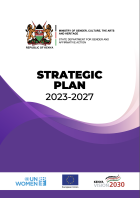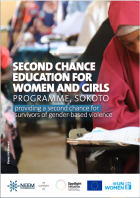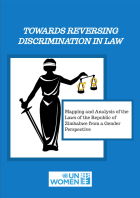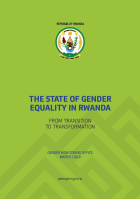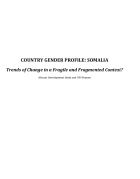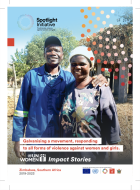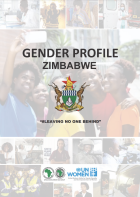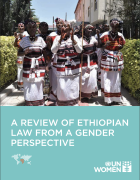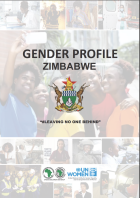1 - 20 of 25 Results
Pagination
Date:
This study provides an overview of the kinds of administrative data on discrimination and inequality currently being produced in 22 countries across Africa. It also identifies the data and capacity gaps as well as other barriers that prevent this kind of data from being used for statistical purposes. The recommendations of the study are aimed at helping producers and users of administrative data and statistics on discrimination and inequality improve the availability and accessibility of quality data. This can be done by for example improving data governance and statistical coordination, amongst other interventions. Increased accessibility and regular publication of this data will also contribute towards greater uptake and use and ultimately more informed decision making and better monitoring of discrimination and inequality on the continent.
Date:
Discover the key insights and milestones of the Beijing Declaration and Platform for Action (BPfA) as we approach its 30th anniversary in 2025. This publication explores progress made, persistent challenges, and Kenya’s contributions to gender equality. Highlighting actionable steps for individuals and organizations, it connects the BPfA to the Sustainable Development Goals, emphasizing its continued relevance in driving transformative change for women and girls globally.
Date:
The Publication is a detailed strategic plan for the period 2023-2-27. It highlights previous achievements, lessons and emerging issues that define the policy direction of the gender sector achieving a society free from gender discrimination and violence
Date:
This is a fact sheet for UN Women East and Southern Africa quarterly knowledge series which has been developed from a multi country analytical study on access to justice for women and girls in in East and Southern Africa conducted in 2021.
Date:
Under the leadership of the Ministry of Gender, Child, and Social Welfare, in collaboration with the Ministry of Peace Building, and with support from UN Women and international funding, the Women’s Charter empowers women and girls to engage with the Reconstituted National Constitutional Review Commission (R-NCRC). Launched on May 29, 2024, in Juba, the Charter addresses twelve critical themes, advocating for comprehensive legal, policy, and programmatic interventions in the Permanent Constitution-making process.
Date:
Prioritizing Women's Peace and Security to achieve Gender Equality.
Date:
Under the Joint UN-EU Spotlight initiative, the Second Chance Education center for Women and Girls, Sokoto, was established to ensure GBV survivors in Sokoto get a second chance at economic empowerment and basic education. This document highlights some of the human impact stories made by the Joint UN-EU Spotlight initiative in Sokoto
Date:
The aim of the publication is to identify and analyse laws with a discriminatory impact on women and girls in Zimbabwe and provide recommendations for repeal or revision of such laws as an important part of a broader legal reform agenda that supports the achievement of gender equality
Date:
This publication highlights the progress and prevailing gender gaps in Rwanda so far as far as Gender Equality and Women's Empowerment is concerned. It also gives insights into the state of gender equality in the National Strategy for Transformation (NST1) pillars.
Date:
The publication presents a Country Gender Profile for Somalia examining core trends in gender and inclusion, new policies and legalisation, and institutional capacity to promote gender equality, particularly in a fragile and fragmented context, with change and progress assessed since 2012.
Date:
Galvanizing a movement, responding to all violence and discrimination against women and girls in Zimbabwe. After four years of programming in Zimbabwe, the EU-funded Spotlight Initiative has made milestones in ending all forms of violence and discrimination against women and girls. This story booklet captures voices of the programme beneficiaries and various stakeholders in all five programme districts across Zimbabwe.
Date:
This publication discusses Zimbabwe's progress with regard to gender equality and the empowerment of women in the different spheres. The profile also provides concrete recommendations and strategies in accelerating the advancement of gender equality and the social and economic empowerment of women. Also, it provides recommendations and guidance to promote gender sensitivity of future programming and projects.
Date:
The Report documents our work with communities and stakeholders to advance Gender Equality in Zimbabwe, the challenges, interventions and results achieved
Date:
This edition of our quarterly publication, aimed at keeping our esteemed readers abreast with the endeavors of UN Women Uganda, encompasses the period of October through December 2022. Within these pages, we have meticulously curated a selection of activities undertaken by our organization, as well as providing a platform for the voices of those whom we have had the privilege of serving, to be heard. We trust that the contents of this newsletter will prove to be both enlightening and informative. Enjoy the read!
Date:
The assessment offers a series of measures for re forming Ethiopian law to ensure that laws are gender sensitive and more effective at ensuring gender equal ity and non-discrimination. Most notable is that a total of 5 laws or provisions must be repealed in whole or in part; 26 laws must be revised or amended and two (2) new laws must be enacted to bring Ethiopia’s legislative framework in line with its regional and international obligations on gender equality and women’s empowerment. The report also emphasizes the need to prioritize the implementation of national laws that comply with gender equality standards, and in this context, recommends one policy measure to ensure that laws fully deliver on women’s rights
Date:
This guide is designed to increase the understanding of the legal obligations of countries in the West and Central Africa (WCA) region to achieve gender equality in decision-making. It focuses on strengthening efforts to improve the legal framework in the region to ensure that laws are clearly drafted, implementable and effective. Special focus is devoted to the processes by which laws supporting political participation of women are developed, negotiated, drafted, passed and implemented. It aims to strengthen law-making processes that build and secure the legal rights of women who want to run for elections and who are ready to take over leadership positions in their parliaments and governments. Legal instruments are presented that can be used to advance the political participation of women.The comparative experiences presented in this guide address both examples of good practices and laws that have failed because their regulations are imprecise, unclear lack effective sanctions
Date:
This publication describes the UN Women Rwanda Office's effort in dealing with Gender-Based Violence (GBV) victims using different approaches in both GBV prevention and response. It also provides success stories from different beneficiaries in relation to legal assistance which showed that in most cases it requires strong courage from the victims to bring the perpetrators to justice especially in the context of negative cultural beliefs, women's economic dependence, fear of discrimination and stigmatization among other challenges. The document also highlights the role of mobile legal clinic in increasing the proximity of legal services to the community including awareness-raising and legal literacy.
Date:
This analytical study covered ten countries in the region and looked at issues of access to justice for women and girls in East and Southern Africa.
Date:
The Gender Profile gives an overview of Gender Gaps by assessing policy and legal frameworks, the institutional and human resources capacity, the socio-economic impacts of Covid-19 on women and men and recommends key areas of strategic actions to address gender gaps and inequalities
Date:
This report highlights UN Women Nigeria’s work for the year 2020. The report builds around the Nigeria Country Office programmatic areas of intervention and reflects the achievements attained in collaboration with various government and non-governmental partners who contributed to policy advocacy efforts, delivery of services, implementation, and funding of interventions aimed at promoting gender equality and women’s empowerment. The population at large (men, women, boys...



